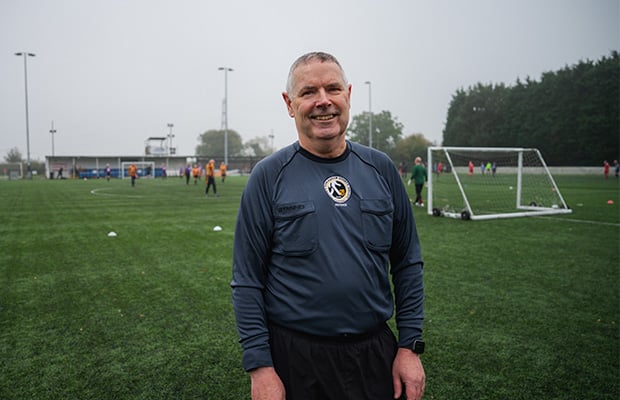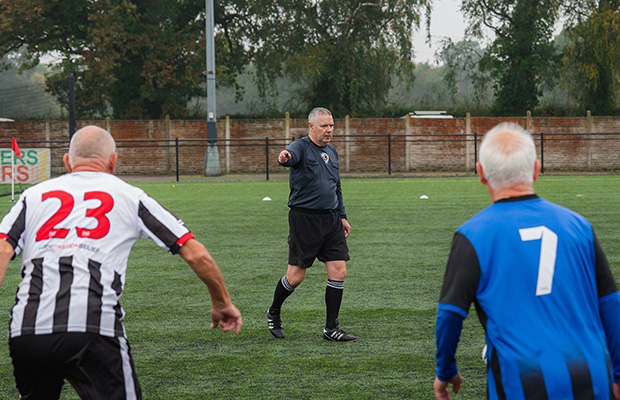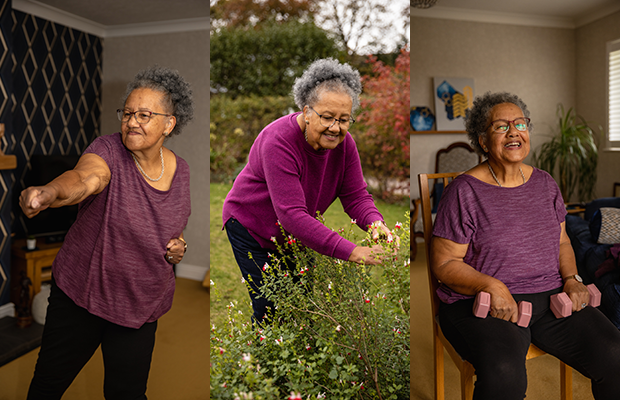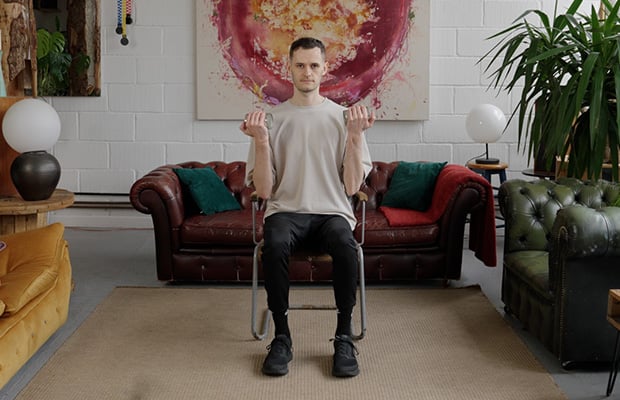Football has been at the centre of Chella Chilombo Sikazwe’s life for almost 50 years, so it was very difficult for him when a heart attack threatened to put an end to his playing.
The 68-year-old sports fan, from Leeds, grew up in Zambia, where his interest in team sports began.
When he was a young man Chella (pictured above) moved to the UK to study engineering at university.
He kept up his interest in football, playing through university social clubs and the local amateur Leeds Sunday Football League.
Chella was so passionate about the game that when he was in his 40s, he even took over the running and management of one of the Leeds Sunday league teams for 12 years.
Chella’s heart problems started a few years later. In July 2020 he was working in security services at a university when he had a heart attack.
In the run up he had felt dizzy on a few occasions. After one episode, he went to A&E to get checked out and was told he’d had a heart attack.
Chella had a stent fitted to reopen a blocked coronary artery.
“Afterwards I was more careful about what I did and more conscious of my health,” he says.
“My recovery was slow. At first I could not walk far or do vigorous activity. I felt very frustrated not being able to play football, go running or do sessions at the gym – all things I like to do to maintain my physical and mental wellbeing and to meet other people.”
The slower pace is safer
It was during his recovery that Chella heard about walking football. He joined a local club, and he has not looked back.
“Walking football is fantastic because there are protective measures and a slower pace,” says Chella. “It’s a bit safer and gives you more encouragement and confidence to play.”
Chella says the walking version of the game suits him at his age as he no longer suffers from injuries, or constantly feels stiff from knocks and falls experienced during normal football.
He adds that the other, older players share their health stories readily; so much so that he sometimes refers to their sessions, as ‘walking clinics’.
“For me it’s about meeting new people and learning from them,” he says. “Sharing with them, enjoying ourselves, and growing in our personal development.
"I’m maintaining a certain level of physical activity which keeps me healthy and confident and has improved my wellbeing. I feel better about myself.”
Want to get fit and healthy?
Sign up to our fortnightly Heart Matters newsletter to receive healthy recipes, new activity ideas, and expert tips for managing your health. Joining is free and takes 2 minutes.
I’d like to sign-up
Football’s the love of my life

Kevin McGovern-Ims, 65, from Bromsgrove, shares Chella’s sporting passion. “I’ve been lucky that I’ve been involved in, and in love with, sport all my life,” says Kevin, who grew up in Dundee.
“My two brothers and I played amateur football and like everybody else in Scotland, I had dreams of playing for the fabulous Celtic Football Club.”
Although these dreams did not come true, his love of football remained a constant.
Wherever he worked and wherever he lived, Kevin (pictured above) always found a football club to play with.
In 2000, Kevin moved to Shropshire to work in the IT industry and a group of friends invited him to join their 5-a-side football team.
“That became the most important part of my week,” he says. “It was quite a hectic, intense game and it was cathartic. It really got rid of all the stress that you build up.”
Goodbye to ‘hectic’ games
When he was in his 50s, Kevin passed out one day during a 5-a-side game in Shrewsbury. He had tests and was diagnosed with hypertrophic cardiomyopathy.
It’s a condition where the muscle wall of the heart becomes thickened and stiff, making it hard for the heart to pump blood out of your heart and around your body.
Kevin says the cardiologist sat him down and said he needed to make some changes, especially with regards to sports.
“In other words, I had to slow down and say goodbye to my weekly 5-a-side games,” says Kevin. “Obviously, that was quite a blow to me because playing footy really was my heartbeat.”
Kevin was determined to stay active. Shortly after the conversation with his cardiologist, he learned about walking football and was delighted to discover his football days were far from over.
“I was aware of walking football, but I had never played it,” says Kevin. “So I sat down with my wife and we looked into it. In 2016, a few years after my diagnosis, I reached out to Hindlip FC, a walking football group in Worcestershire, and went to see them.
"When I met them, I thought, you know what, it doesn’t look too bad and it’s a lot more active than it sounds.”
Kevin adds, “Because I’ve always been playing football, I adapted to it very quickly and it became as much a part of my life as regular football had been before my diagnosis.”
In fact, Kevin became so passionate about the game that he qualified as an official Walking Football Association (WFA) referee and tournament referee.
He now also referees in walking football leagues in Birmingham and Worcestershire, and is pictured below refereeing at the Birmingham County Walking Football League at Coleshill.

Winning for mental health too
Kevin says the game has many mental, as well as physical, benefits. “So many men struggle with their mental health and do not have the opportunity to discuss it,” he says.
But through sport, he has gained confidence to discuss mental health issues with his peers. “Sport has been my crutch,” he says.
“Really, wherever I’ve lived and worked throughout my life. As soon as I reconnect with sport, my mental health improves,” he says.
Chella agrees. He has found great comfort in getting to know people who can really empathise with him.
“I find meeting and talking to other people very useful and reassuring,” he says. “Because we are a similar age and have had similar experiences, you don’t feel like you’re on your own.”
Chella is now involved with two walking football teams and recently started playing table tennis with a group for over 55s.
He adds: “After a certain age, so many people suffer health conditions. Sharing with people helps, because you know you’re not the only one.
"You meet people in similar situations who are enjoying their life. If I stayed at home alone, I would not experience that.
“My advice to someone who is interested in walking football would be to just give it a go and see how you feel. I think you’ll end up going often.”
Kevin points out that there are walking versions of many sports. “After a heart event, the sooner you can get back to being active again, the sooner you’ll start to feel stronger and better.”

How to get involved in walking sports
According to the Walking Football Association (WFA): “Walking football is a unique small-sided ball game created by John Croot in 2011. It’s the game you love and remember but played in a new way.”
England Football’s website says it’s ideal for those who want to “play football for longer, make new friends, get out of the house and stay active”.
The game is like association football but there is no running, jogging or heading the ball. Tackling is with reduced physical contact, which makes it safer for players.
Visit the WFA’s website to learn more about walking football or to find a team near you.
There are walking versions of many other sports, including basketball, cricket, hockey, netball, rounders and rugby.
At Just Get Active you can find out more about different walking sports.
Search the Walking Sports Directory to find out about walking sports near you.
Tried this at home?
Have you tried walking sports? Or do you have a healthy tip to share? Email your thoughts and any photos for a chance to be featured in the next magazine.
What to read next...












